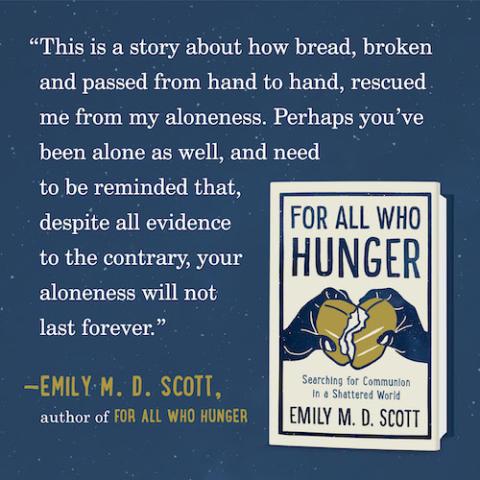
The Rev. Emily M. D. Scott (Anna Hosey)

The Rev. Emily M. D. Scott (Anna Hosey)
I wasn't surprised when, in late July, the Vatican put out new instructions limiting the extent to which the laity can preside over a parish. But I was sad to see an institution so intent preserving clerical power that it is willing to deny the gifts that the laity offer to the life of the church every day.
Laypeople, the document says, should not be "directing, coordinating, moderating or governing the Parish."
Only a priest can exercise "the full care of souls," the Vatican tells us — which means, of course, women never can.
I read these guidelines just after finishing Emily M. D. Scott's new memoir, For All Who Hunger: Searching for Communion in a Shattered World. Scott (who was my classmate at Yale Divinity School) recounts her story of trying to create a new kind of church in New York City, a place she finds achingly lonely and isolating.
Scott came to the city to take a job as director of worship at a revered Protestant church uptown. The congregation is roiled in conflict, and its leadership is closed off to fresh ideas.
That church, she writes, was "all gray stone and steeple and unmoveable wooden doors" — the kind of church where a lot people, especially young people, feel like they can't get a foot in the door. Scott says they are longing for something bigger that they cannot name and that the institutional church cannot seem to offer them:
The thing they are hungry for — a place to be known, a place to be still in the face of the mystery and confusion of life, that thing that draws them to sit in the back pew of a great stone cathedral on a Sunday morning when they might have been at brunch with friends — too often seems tertiary at any church they might attend.
Scott and her divinity school friend, Rachel, hatch a plot for a "Dinner Church," a space where the creeds, chasubles, conference tables are stripped away, and liturgy returns to its basic elements: bread, wine, water, oil and the words of Jesus. They would also literally serve dinner. "In a place where hardly anyone has room in their cramped apartments for a dining table, cooking and eating together feels particularly potent," she writes.
What makes Scott's vision so rich is that she is not out to not create a new version of low-church Protestantism. Her sacramental imagination is vivid and lush. She wants to dismantle the trappings of the church so that the meaning of its most fundamental symbols is "so transparent that no one would ever say, 'It's lovely, but what does it mean?' "
Scott is a lot like many millennial Catholics I know who are training for ministry in graduate school, longing to minister in their church, but unsure if the church leaders will actually welcome their talent and pastoral abilities.
Advertisement
Where her experience differs from innovative, young adult Catholics is in the support she receives from some members of the clergy. One of the more moving parts of the book is when Scott and Rachel pitch the dinner church idea to the pastor of a small, financially strapped congregation on Manhattan's Lower East Side. He is "a real pastor with a real collar and a real office," Scott writes. "And I feel like the opposite of that — some young, unordained woman who thinks she can start a church."
They excitedly tell Pastor Phil about their dream, and when they finally run out of words, he is silent and reflective. "I think it's wonderful," he finally announces, annunciating each word.
Of course, Scott's journey is hardly easy. After a year at that location, St. Lydia's Dinner Church has a nomadic existence, until it finally settles in a storefront in Brooklyn. Scott named the church after a woman in the Acts of the Apostles who is known for her hospitality, but also for "heading her own business and her own household, no husband in sight."
In time, Scott is ordained in the Lutheran Church and installed as pastor at St. Lydia's, with Pastor Phil and many other mentors and church leaders laying hands on her in the ceremony.
The church always struggles financially, their storefront space has a sump pump that regularly breaks down, and, of course, there is the stress of attending to the pitfalls of Dinner Church, particularly awkward silences during the meal and the creative liturgical ideas that fall flat.
But Scott finds an abundance of holiness in the mess, and some of the best narratives in her memoir recount moments of grace in simple or difficult situations, like a random offer of free ice cream after a group renovation project and the ways a cantankerous, demanding parishioner becomes a blessing.
Those who have ministered among misfits, or in the midst of scarcity or on the fringe will particularly appreciate Scott's sacramental view of it all, which is reminiscent of Sarah Miles' stunning 2008 memoir, Take This Bread. "That is the miracle: that there is never enough, yet always enough," she reminds us throughout her story.

(Provided graphic)
Scott's description of baptizing a community member on a sidewalk with a washtub and a bucket of frigid water and her account of her final Easter Vigil with the community breathe new life into these ancient rites. "Transcendence happens in moments when a boundary is crossed and we defy the limits that usually define our lives," she writes, "when something sacred happens in an ordinary place." She fills her book with those moments but is remarkably candid about the times she misses the mark and her bouts of burnout. In 2017, she made the agonizing decision to leave St. Lydia’s after nine years of leadership.
Scott and St. Lydia's are also deeply committed to justice and activism, and her sections on the community's anti-racist work seem to have an almost preternatural sense of the imminence of the movement that has shaken this country and the foundations of white supremacy since the murder of George Floyd in late May. Her discovery of the profound social and economic inequality in the wake of Superstorm Sandy also speak prophetically to our current pandemic.
For All Who Hunger is an inspiring and affecting answer to the question I have been getting for over a decade: Why aren't millennials interested in the church? As I've said before, young progressives really do care about the church. St. Lydia's is the miracle that can happen when the church simply gives access to new ideas and a new generation of leaders.
[Jamie L. Manson is a longtime, award-winning columnist at the National Catholic Reporter. Follow her on Twitter: @jamielmanson.]






